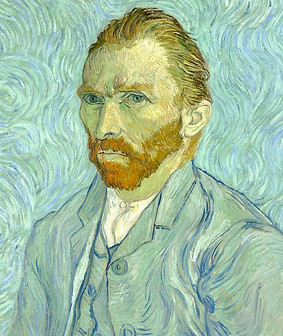Inspiration

While the elevated mood episode can be problematic at times, if you are aware of the symptoms and take the right steps to make sure everything is under control, the extra energy and creativity that comes with it can be put to good use. Under safe circumstances, it can result in work that everyone will appreciate. With proper treatment, bipolar disorder can become a powerhouse rather than a hindrance to success. After all, who wouldn't want their brain to have an extra gear? Most people who experience hypomania, for example, will report it as a pleasurable experience. Sure, the anxiety can be overwhelming at times, but when you can safely direct all that extra motivation toward a specific goal, the progress you can make can be extraordinary. I think all of these aspects of the disorder should be celebrated and empowered in today's society. If you are still unsure about the potential of the bipolar community, take a look at the historical figures below, whose life work inspired humanity for centuries with their timeless contribution that made them the legend they are today.
Historical Figures

Ludwig Van Beethoven
Revolutionary composer, pioneering the romantic era
Born in 1770 in Bonn, Germany, Ludwig van Beethoven was destined to transform the world of music. From a young prodigy to a legendary composer, Beethoven moved to Vienna, where he defied his era's conventions and crafted timeless symphonies, sonatas, and concertos. His indomitable spirit and innovative genius cemented his place as a titan of Western classical music.
Historical accounts suggest Beethoven experienced extreme mood swings, periods of deep depression, and intense bouts of creativity, all of which have led some scholars to hypothesize he might have had bipolar disorder. His letters and diaries reveal his struggles with his deteriorating hearing and personal turmoil, often reflecting a mind in distress.

Isaac Newton
Laws of motion, universal gravitation.
Isaac Newton, born in 1643 in Woolsthorpe, England, was a visionary who revolutionized our understanding of the physical world. His magnum opus, "Mathematical Principles of Natural Philosophy," laid the foundational principles of classical mechanics, propelling him to legendary status. Newton's unparalleled intellect and relentless curiosity drove him to make groundbreaking advances in physics, optics, and mathematics.
Newton's life was marked by episodes of severe depression and paranoia, which some biographers interpret as symptoms of bipolar disorder. His periods of immense productivity were often followed by times of withdrawal and erratic behavior, which were documented by his contemporaries.

Vincent van Gogh
Artist, post-impressionist movement, vivid and emotional paintings
Born in 1853 in the Netherlands, Vincent van Gogh's artistic journey was nothing short of extraordinary. His explosive creativity and unique vision produced over 2,000 artworks that redefined post-impressionism. Despite facing profound personal struggles, Van Gogh's work radiates with emotional intensity and color, immortalizing him as one of the most influential artists in history.
Van Gogh's life was fraught with mental health issues, including episodes of psychosis, depression, and self-harm. His turbulent relationship with his brother Theo and other personal struggles have led to speculations that he suffered from bipolar disorder. His hospitalization and infamous incident of cutting off his own ear highlight the severity of his mental health challenges.

Disclaimer:It is important to note that assessing historical figures' mental health using modern diagnostic criteria involves a significant degree of speculation. Historical accounts can be incomplete or biased, and the cultural context of the past differs markedly from today’s understanding of mental health. Therefore, while hypotheses about conditions like bipolar disorder in historical figures can offer intriguing insights, they cannot be confirmed with certainty.
Positive Traits
While bipolar disorder is a serious diagnosis, that doesn't mean it's all bad. Here are some examples of positive traits that have been commonly observed in people with bipolar disorder.
Intelligence
First, bipolar disorder is positively correlated with intelligence, which may be counterintuitive to the general population because mental illness is often mistakenly associated with either violence or lack of common sense. These stereotypes we see in movies or on the news unfortunately contribute to the social stigma surrounding mental illness. In reality, the society we live in benefits greatly from neurodiversity, including bipolar disorder.
Creativity
Second, bipolar disorder is correlated with higher levels of creativity. The creativity that emerges as a result of the elevated or even depressed mood episode can be absolutely stunning. Many artists and innovators have created amazing works while living with bipolar disorder.
Adaptability
People with bipolar disorder may have developed the ability to adapt to changing circumstances and manage their moods in response to different situations.
Perseverance
Bipolar disorder can be a difficult condition to manage, and people with the disorder may have developed a strong sense of determination and persistence as they work to maintain their mental health.
Empathy
Some people with bipolar disorder may have developed strong empathic skills as a result of their experiences with mood swings and their ability to understand and relate to others who are struggling with mental health issues.
Resilience
Living with bipolar disorder can be a challenging experience, and people with the disorder may have developed a strong sense of resilience as they work to manage their symptoms and maintain their mental health.
It is important to recognize that these are just a few examples and that people with bipolar disorder are as diverse and individual as any other group.
Sources:
Positive Traits in the Bipolar Spectrum: The Space between Madness and Genius
https://www.ncbi.nlm.nih.gov/pmc/articles/PMC5318923/#:~:text=Positive%20psychological%20traits%20of%20spirituality,improve%20clinical%20outcomes%20%5B240%5D.
5 Positives of Living with Bipolar Disorder (Besides Creativity)
https://ibpf.org/articles/5-positives-of-living-with-bipolar-disorder-besides-creativity/
Bipolar spectrum traits and the space between Madness and Genius: The Muse is in the Dose
https://www.sciencedirect.com/science/article/pii/S0022395622003740
Bipolar and Intelligence: How Are They Linked?
https://www.psycom.net/bipolar-disorder/bipolar-and-intelligence